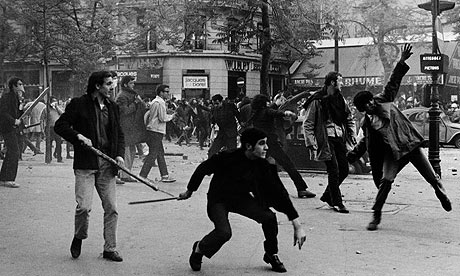– Mike Kay
On May 1st 1968, Paris erupted. There had been a few big strikes in the years leading up to it, but by and large the upsurge took all by surprise.
It was the tenth anniversary of the day General De Gaulle had seized presidential power in France by an unresisted military coup. The parliament, feeling helpless to deal with the escalating war in Algeria, had voted over its powers to De Gaulle. The Fifth Republic that he established included wide-ranging presidential powers, reducing parliament to little more than a rubber stamp. During the Algerian war, protests were suppressed with lethal force.
The 1968 protests started with the students at Nanterre on the outskirts of the city. They had begun a campaign to visit each others’ rooms in halls of residence after 11pm, in defiance of their administration’s curfew.
Their campaign drew in students from all over France, who added their own grievances and demands. The immediate issues were the dereliction and overcrowding of universities, which were bursting at the seams due to the trebling of the number of students in less than a decade, and the government’s plans to impose exams in order to reduce the numbers of first-year students.
Violent state repression only served to spread the movement. The daily demonstrations and occupations soon inspired workers to strike in industries from car production to banking. The workers’ demands were at first minimal – for wage concessions and greater social security. However, as a mass strike wave developed and continued throughout May, many long-germinating working-class aspirations came to the fore and began to lead to much more revolutionary demands.

